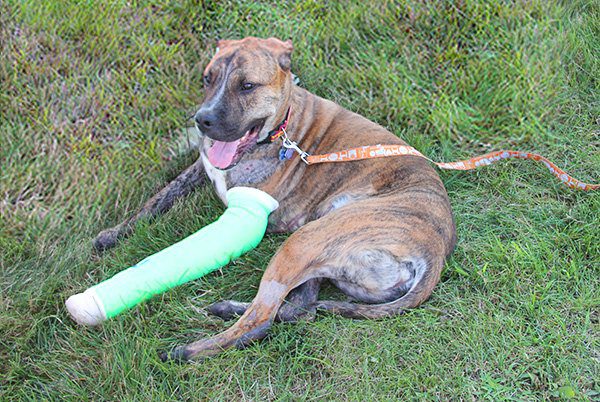James R. Speiser, DVM, DABVP, CCRT
January 10, 2017
Pets are a unique part of our families and they behave like furry children in more ways than one. Sometimes they get hurt and it’s helpful to know how to spot the difference between something serious and something that is not. Sometimes accidents happen or play gets too rough, but by knowing more about which injuries are more common you should be able to recognize when something is serious and needs attention from your veterinarian.
- Eye Trauma – dogs and cats often obtain scratches on their eyes. If your pet is blinking, tearing up excessively, or they won’t allow you to come close to their eye you should seek veterinary attention. Eye issues do not have to look severe to be emergencies.
- Foreign Body Ingestion – Dogs are known for not being too picky about what they eat or chew on. If you can name it, it’s probably been ingested by a dog and removed by a vet. If your animal is repeatedly vomiting and doesn’t want to eat for longer than a day, you should take them to be evaluated. If the pet has vomited once or twice and is still interested in eating or drinking and is active and alert, withhold food for 24 -36 hours to see if the vomiting or diarrhea subsides. If not, then it is worthy of a trip to the veterinarian.
- Broken Nails – A torn or broken nail can occur if your pet’s nails become too long. This type of injury can be accompanied by bleeding that can be quite messy as the pet walks or runs around! If your pet’s nail rips and it cannot be easily pulled off, it may require that it be trimmed beyond the crack and this may require sedation and a trip to the vet. If you accidentally cut too far when trimming nails yourself, use styptic powder, baking soda or even flour to help the blood clot, and you can apply a bandage wrap to the paw for 5 to 10 minutes. If the bleeding won’t stop, you should take your pet to the vet.
- Dehydration – Dehydration and heat stroke are common in pets that are elderly, overweight, or short-faced breeds like bulldogs. Dehydration may occur in any sick animal that has been vomiting or has not been eating for any number of reasons. Common signs of dehydration include sunken eyes, lethargy, and dry mouth. To avoid heat stroke, be mindful about exercising your pet in hot weather, make sure they always have access to shade and water, and NEVER leave your pet in a car in warm weather.
- Animal Bites – bites from other animals can range from minor to serious depending on the animal involved. Fights are common between cats and dogs, with the most common scenario being larger dogs attacking a smaller dog or cat. Skin lacerations, bleeding wounds, bites, or bruises are typically good indicators that a bite has occurred. Cuts and wounds need to be covered with something clean and dry and if there is bleeding you should apply firm pressure to help stop the bleeding. A wound may require stitches, bandages, or antibiotics if there is an infection. Bite wounds that don’t appear very important can be penetrating wounds to the chest or abdomen which is very serious, so most bite wounds over the chest or abdomen should be evaluated by a veterinarian. An animal that has been bitten may be more aggressive, so take precautions when transporting to the vet.
If you are ever concerned about the safety or health of your pet, be sure to contact your veterinarian to determine if an examination is needed. Pets can’t tell us what’s wrong so it is up to us to observe and be aware of changes in an animal’s behavior that may indicate something is wrong.

